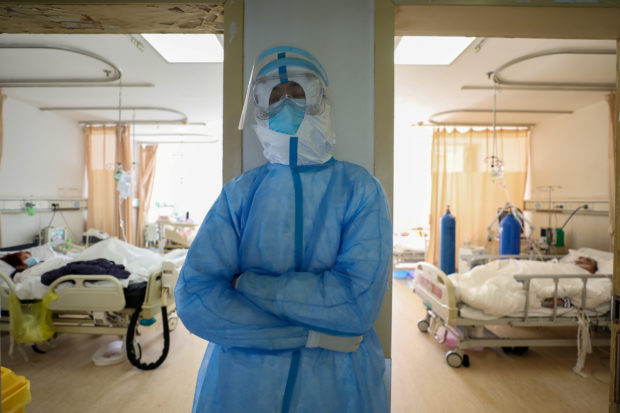
EPICENTER A medical worker takes a break at an isolated ward of Wuhan Red Cross Hospital in Wuhan, Hubei province, China, in this file photo taken on Feb. 16, 2020. —REUTERS
MOSCOW—Countries around the world stepped up their coronavirus vaccine campaigns on Monday, with Russia offering jabs to all citizens, while an independent probe found fault with the early response to the pandemic.Both the World Health Organization (WHO) and Beijing could have acted faster when the new coronavirus first surfaced in China a year ago, the Independent Panel for Pandemic Preparedness and Response concluded in a report.
It added that countries where the virus was likely to spread should have put containment measures in place immediately.
WHO reforms
The experts reviewing the global handling of the pandemic, led by former New Zealand prime minister Helen Clark and former Liberian president Ellen Johnson Sirleaf, called for reforms in the United Nations agency based in Geneva.
Their interim report was published hours after the WHO’s top emergency expert, Mike Ryan, said that global deaths from COVID-19, the severe respiratory disease caused by the new coronavirus, were expected to top 100,000 per week “very soon.”
“What is clear to the panel is that public health measures could have been applied more forcefully by local and national health authorities in China in January,” the report said, referring to the initial outbreak of the new disease in the central city of Wuhan, in Hubei province.
As evidence emerged of human-to-human transmission, “in far too many countries, this signal was ignored,” it added.
Specifically, it questioned why the WHO’s emergency committee did not meet till the third week of January and did not declare an international emergency until its second meeting on Jan. 30.
“Although the term pandemic is neither used nor defined in the International Health Regulations (2005), its use does serve to focus attention on the gravity of a health event. It was not until [March 11] that [the] WHO used the term,” the report said.
“The global pandemic alert system is not fit for purpose,” it said. “The World Health Organization has been underpowered to do the job.”
Mass vaccination
With the global death toll now past 2 million, many governments are betting on mass vaccination to throttle the pandemic, while tightening lockdown measures at the same time.
Nationwide rollouts from Brazil to Azerbaijan were getting under way on Monday, while Britain and France were widening inoculations to all elderly people.
In Russia, the government invited all citizens to sign up for the homegrown Sputnik V jab—but while it was widely available in Moscow, many regions reported receiving only between 5,000 and 15,000 doses in the country of 146 million.
India’s campaign was also facing teething problems as it emerged that almost a third of the 300,000 people invited for a shot on the opening day didn’t turn up.
“These are initial days and we understand people are waiting to see how the procedure pans out,” said Suneela Garg, a member of the coronavirus task force for New Delhi. “These numbers will go up as confidence is strengthened. And for that, we have to tackle misinformation.”
‘Gift from God’
Authorities worldwide have been mounting public information campaigns to deal with concerns over vaccine safety, and in the face of powerful online antivax movements.
After 33 elderly people who had received a first dose died in Norway, authorities there stressed there was no proven link between the jabs and the deaths. They recommended, however, that doctors consider patients’ frailty before immunizing them.
For Syrian refugee Fatima Ali, receiving her vaccination was cause for tears of joy.
“It’s a gift from God,” the 70-year-old said as she was vaccinated outside a clinic in Mafraq, Jordan. —REPORTS FROM AFP AND REUTERS